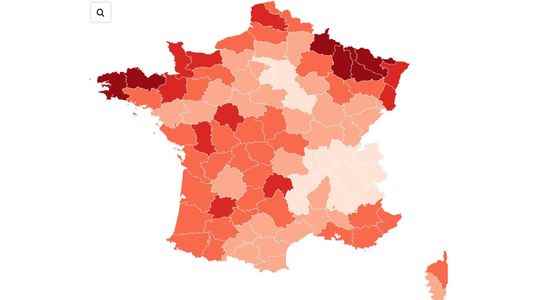Have we lifted most of the anti-Covid restrictions in France too quickly, despite the rebound in the epidemic observed in recent days? Olivier Véran may well defend himself, some doctors accuse the government of acting too quickly and of confusing professionals. “Yes, we made the right decision,” said the Minister of Health on Wednesday March 16. franceinfotwo days after the lifting of almost all measures to combat Covid-19, on Monday March 14.
This relief comes down to two major measures: the end of the vaccination pass, which required you to be vaccinated to enter many places such as restaurants and cinemas, and the end of the obligation to wear a mask, except in public transport. In lifting these restrictions, the French government is following the example of many European countries. He also obeys a broad political consensus in the run-up to a presidential election where Emmanuel Macron is seeking a new mandate: none of his opponents has contested these reliefs on the merits.
The rising incidence rate
But the calendar does not fit well with the reality of the epidemic. This has resumed since the beginning of March, with a rebound in the number of cases, which the researchers explain in particular by the reduction in the precautions taken by the French. “There is a movement of general relaxation in France, it must not be hidden, in Europe and in the rest of the world”, admitted the Minister of Health.
This translates into the numbers. At the national level, the incidence rate is 742.60 cases per 100,000 inhabitants, an increase of 30.52% in seven days, according to the last report health authorities dated March 14. This indicator is also on the rise in all the departments apart from only two of them: Ariège and Lozère. It even reaches 1,400.59 cases per 100,000 inhabitants in the Ardennes.
To view the map, Click here
For the Minister of Health, this resurgence of the epidemic did not, however, justify maintaining the restrictions. Based on projections from the Pasteur Institute, he estimates that the current rebound should not last beyond the end of March and will not overload hospitals.
The optimistic projections of the Institut Pasteur
Indeed, in its scenarios published last week, the institute anticipated the increase in contacts between people favoring the circulation of the virus. “The relaxation of control measures on March 14 is expected to further push transmission rates upwards,” the document reads.
Whatever the extent of the future release, the researchers nevertheless envisage a much lower peak in contamination than that observed at the beginning of this year. Now “80% of people” are vaccinated and “a significant proportion of the population has already been affected by the infection”, explains Yazdan Yazdanpanah, head of the infectious diseases department at Bichat hospital, in Paris, to France Inter. This immunity probably protects us against the Omicron variant. In any case at the level of hospitalizations.” However, the government had issued several conditions for the lifting of the restrictions, which have not been reached, recalled to L’Express a few days ago Professor Antoine Flahault, epidemiologist and director of the Institute of Global Health at the University of Geneva However, according to him, “the mask represents a good means of limiting the circulation of the virus, and it is all the more effective when its wearing is generalized.”
“And too bad for those who will die,” epidemiologist Dominique Costagliola reacted on Twitter. Like many of her colleagues, she is particularly concerned about the fate of immunocompromised people, in whom vaccines are little or not effective and who are therefore more at risk of developing serious forms. The context is also complicated by the seasonal flu which gives rise to its own epidemic and shows no signs of easing, whereas in normal times, the peak is reached around February.
The support of the Scientific Council
The government nevertheless has the measured support of the Scientific Council, the body which advises it in the management of the epidemic. He believes, in an opinion made public on Tuesday March 15, that it is time to move on to a policy rather centered on “individual responsibility”.
The Scientific Council judges that the epidemic “remains under control”. However, he warns that it is not over and warns of a “trivialization of the epidemic in society”. But the government’s decision is not only criticized on the merits. The health authorities are also accused, on the form, of having acted in haste by giving vague instructions on the implementation of these reductions.
A lack of clarity
A “flutter (…) reigns for a few weeks”, estimated Wednesday March 16 in a press release the Union of liberal doctors (SML), a minority but representative organization within the profession. A text crystallizes the criticisms: an “urgent”, published on March 15 by the General Directorate of Health (DGS), which depends on the ministry. Intended for caregivers, this type of document is used to give them concrete details of the decisions taken by the authorities.
However, these instructions appear ambiguous as to the wearing of masks in health establishments, such as hospitals. While it should remain mandatory, the DGS believes that it is supposed to be “required” but returns the responsibility to the director of the establishment. As for liberal doctors, they have “no clear directives” on the subject, believes the SML, which calls on professionals to require the wearing of masks in their offices.
The organization is surprised, finally, by the announcement made on March 12 by Jean Castex of the opening to those over 80 of a “fourth dose”, that is to say a second reminder of anti-virus vaccine. -Covid. “This subject had not been raised last Friday (March 11)”, during the government’s discussions with liberal health professionals, reports the SML, which is ironic about “the government’s understandable feverishness at the approach of the elections “.
